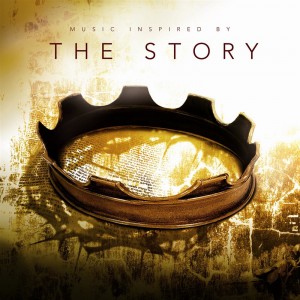Click “Like” to share this with your friends!
Nicole Nordeman hasn’t released an album in six years. She hasn’t played a concert date in nearly as long. And that’s perfectly fine by her. Instead, Nordeman is performing her favorite role as a full-time mother and wife while dabbling in the occasional songwriting venture.
But when longtime manager Norman Miller approached her about a special project called The Story and that producer Bernie Herms desired to have Nordeman pen lyrics for all 18 songs, the eight-time Dove Award winner couldn’t pass up the opportunity. The album, based on the book by Max Lucado and Randy Frazee, released in September and features some of the biggest names in Christian music.
Whole Notes caught up with Nordeman recently to talk about her sabbatical from the business, why she accepted the challenge to write this collection of songs and how the process has profoundly changed her life:
Chad Bonham: Are you enjoying life away from full-time music?

Nicole Nordeman: I am. I really am. I just could not find a good balance, I think because I’m an all-or-nothing person and I felt like I was either a really good full-time artist or really great full-time mom. I was having a lot of trouble doing both well. I have lots of friends who are female artists who somehow find a way to really gracefully balance all of that. They take nannies on the road and they home school on the tour bus. But I just felt like in my heart, that wasn’t for me. I knew I needed to make a clean break and step away. Not just do a little less, but really step away. Get some perspective. Immerse myself in my life as a mom. And then I kind of figured I would know when the time was right to dip my toe back in the water a little bit creatively. On a purely selfish level, that’s what this project has allowed me to do as an artist and as a writer—get involved a little bit again but still be at home and not jet through airports anymore. I feel grateful.
Bonham: What parts of the artist lifestyle have you missed, if any?
Nordeman: I haven’t performed at all. I haven’t sung a note or played a piano in several years aside from home just playing and writing. I can say now, today, that I’m missing that a little bit. I haven’t missed it for a while and I think I was just really burned out. I needed to detox and remember what it was like to love music again and not just plan for the next gig and frantically rehearse and write for the next record. It’s weird how that becomes such a hamster wheel. So I feel like that’s one of the great things that’s happened. I completely stopped all of that and now I’m remembering what it’s like to listen to a project from start to finish and fall in love with certain songs and then write some stuff and really dig in creatively and not just try to maintain the pace.
Bonham: Do you see a time when you’ll be back on the scene?
Nordeman: Maybe. It can never look like it did. Before you’re married and have kids, you can say yes to anything. It’s the wonderful thing about being a new artist. You pay those dues and it builds character. I could never go back to that pace—there’s no way—and still feel good about my contribution at home. But that was before the digital age. That was before blogging and Twitter and Facebook. I think you can do a lot more from home now if I should choose to reenter that life.
Bonham: Having been out of the music scene for a while, what was your initial reaction when they called you to work on The Story, especially when you realized just how expansive the project was going to be?
 Nordeman: I knew instantly that I wanted to do it and part of that was because the person who brought me the project, who was the visionary behind the musical side of it, Norman Miller, happens to be my manager. It wasn’t like I got this call from someone I didn’t know. He knows my heart and he knows what my self-imposed boundaries are artistically right now. So for him to know that already and come to me and say, “Hey, I think this might be a good fit because I know you’re missing being creative but this isn’t going to require you to be the artist,” that was an easy foot in the door. And then when I got a small understanding of what the project was about, it just felt totally right. It felt like it was right up my alley. I loved the idea of writing about these characters in first person instead of just retelling the events of the story again. I loved the idea of digging into the DNA of their characters. It just felt right from the beginning. It was daunting—don’t get me wrong—because it’s a pretty massive undertaking. But I knew I was ready because I’d had so long to just fill the well again and I had a lot to say finally because I wasn’t so burned out.
Nordeman: I knew instantly that I wanted to do it and part of that was because the person who brought me the project, who was the visionary behind the musical side of it, Norman Miller, happens to be my manager. It wasn’t like I got this call from someone I didn’t know. He knows my heart and he knows what my self-imposed boundaries are artistically right now. So for him to know that already and come to me and say, “Hey, I think this might be a good fit because I know you’re missing being creative but this isn’t going to require you to be the artist,” that was an easy foot in the door. And then when I got a small understanding of what the project was about, it just felt totally right. It felt like it was right up my alley. I loved the idea of writing about these characters in first person instead of just retelling the events of the story again. I loved the idea of digging into the DNA of their characters. It just felt right from the beginning. It was daunting—don’t get me wrong—because it’s a pretty massive undertaking. But I knew I was ready because I’d had so long to just fill the well again and I had a lot to say finally because I wasn’t so burned out.
Bonham: Did you know which artists you were writing for in advance?
Nordeman: We had a wish list going in. I don’t think we said, “Hey, we want Francesca (Battistelli) to sing the Mary part” or “Hey, we want Mac Powell to do the Jesus song.” We didn’t have that clear of an angle. But we did have a list of people we really, really wanted to be on the project. Then it became sort of a matching game. “Who would this song compliment?” or “What artist could inhabit this character best?” Then as the list got smaller and smaller, we had to be a lot more specific.
Bonham: It seems like in some cases though, especially with Brandon Heath singing the part of Joseph on “Bend” that you were being very intentional. Was Brandon singing a song that related so closely to his personal story planned out or was there something else at work?

Nordeman: In that particular case, it was totally a God thing because I knew his story vaguely. I don’t think (album producer) Bernie (Herms) knew his story. I had kind of forgotten that connection. When (Brandon) came into the studio to sing it, I wasn’t there, but they just had some really deep and poignant conversations about what a God thing it was that Brandon would get to sing words that were so healing to his own life through the lens of Joseph. There were a couple moments like that where we saw an awesome confirmation from the Spirit saying, “This is bigger than all of you. I’m involved too.”
Bonham: The songs really bring out the fact that these iconic Bible characters weren’t any different than all of us today. Is that what makes telling their stories in first person form that much more powerful and real?
Nordeman: I think so. That was really the aim from the beginning. This was born out of these books that Max Lucado and Randy Frazee wrote—just completely peeling back the layers of these characters and getting really deep into their story and it connects to God’s story for their lives. That was something that jumped out at me when reading the early chapters—the humanity and the frailty of these people and how we’ve almost idolized them and turned them into these Hallmark card moments with these big moral-of-the-story takeaways. There’s value in that, but we’ve totally lost sight of the idea that God generally prefers to use people who are their wit’s end and people like David. You just look at failure after failure after failure after struggle after failure. And still, through all of that, God says, “I’ve got great things planned for you.” Maybe that’s because the most desperate people seek him the most earnestly. I just remember reading page after page of Max and Randy’s books and thinking, “This is why it connects to us, because we feel as small as these people must have felt.” They’re not heroes. I don’t think we should call them heroes of our faith. They’re icons, maybe. But they had just as many failures and insecurities and misgivings as we do and yet God chose them because of their availability to Him.”
Bonham: Was there one single lyric you wrote for this album that hit you the hardest?
Nordeman: Oh gosh. I would have to have the (lyric) sheet in front of me. One song that always hits me personally is the one that Mac Powell sings, “When Love Sees You,” from the perspective of Jesus. I feel many times when I hear it that those are words He’s singing to me. If we could only see ourselves through His lens. If we could only see ourselves the way He sees us. We spend so much time feeling so small and less than and insignificant and diminished because we see ourselves through our own lens. That song is so beautiful because it encapsulates the heart of God and the heart of Christ in saying, “When love sees you, this is what I see. This is why I came, because I see you this way—how beautiful and perfect you are despite what you see.” So that’s one of the songs that has some personal connection for me.
Bonham: Another one of the album’s more compelling lyrics was from the song about Job (“Broken Praise” sung by Todd Smith of Selah).
Nordeman: The Job story is interesting. The writing of it was very interesting. I was writing it for a particular artist. We wanted it to be this big rock anthem, sort of despite all the pain and grief, I know my redeemer lives kind of moment. I tried and tried and tried to write that song in that way and through that angle—an empowering song. And I just couldn’t do it. I literally worked on that song for months and I finally called Norman and Bernie and said, “This song sucks.” (Laughs) It was horrible. It felt so disingenuous and so false, because I’ve never experienced anything Job-like in my life. First of all I didn’t feel like I could write it because I didn’t have any experience as a writer and it wasn’t coming from a genuine place, but secondly, I didn’t think it was meant to be a big rock anthem. I just shelved it. I put it away for about a month or so. Well, in the process, somebody sent me Mary Beth Chapman’s book (Choosing To See) about she and Steven Curtis losing their daughter. It absolutely wrecked me. I read it in a night. It was the most honest and raw tale of what it’s like to have to grieve something so publicly when all they wanted to do was crawl under a rock. Instead, they were expected to teach people on a national stage and a public Christian stage how to handle loss and grief. It was so honest. I bawled my way through the whole book and I literally picked up the pen and wrote that son, almost through Mary Beth and Steven’s eyes and certainly through Job’s eyes. It was just that idea of, “If one more person,” dot, dot, dot. And still at the end of that, they were able to offer their praise to the Lord. That was a big moment for me as a writer.
Bonham: What was your initial reaction to the finished project?
Nordeman: I’m not sure if I can objective about it. I’m absolutely blown away by the production. I got to see that unfold a lot because Bernie would try an approach musically and then bounce it off of me. I certainly didn’t shape it, but I was able to give some early feedback. But to me, it’s so epic and cinematic. It takes you on this journey that it was designed to. It doesn’t sound like 20 different stories. We really wanted to have some connective tissue there, and musically, I think Bernie just absolutely wove all that stuff together.
Bonham: What was it like working with Amy Grant on your duet “I’m With You?”

Nordeman: It was such a great experience. I’m just like every other female artist I know who group up listening to her, trying to emulate her, admiring her. And I even admire her more now as an adult. She just walks through life with such vulnerability and grace. That is who she is in person. That’s what she brings in to a room when she walks in. It’s just a real tenderness. So I’m just a fan of her as a person, period. But then I got to collaborate with her and get to be in the studio together with her at the same time when we sang, which usually never happens in a duet situation. Usually she comes in and cuts her vocal, I come in two days later and cut my vocal, and then the magical wizards of production put them together. So to get to be in the same studio singing together, trying out different parts, it was really probably the highlight of my career to date. Then the cherry on the sundae was that she is singing a song that I helped to write. That to me was beyond full circle. I was imagining myself as a 10 year old trying to take in what an absolute pleasure and honor that moment was, and it was really special.
Bonham: Just as interesting to me was how you took a look at the bigger picture of the Ruth and Naomi story.
Nordeman: We tried so hard in every song—and that song was no exception—to maybe look at it in a way that’s never been looked at before or find something that hasn’t been said before and speak through the characters. We remember Ruth and Naomi for their faithfulness and especially Ruth’s solidarity. It would have been easy for her to go back home where it was familiar, but she stayed with Naomi because she loved her. Those are the broad strokes that you can take away from the story. But when you start to look at what it cost Ruth to stay, and the anguish it must have caused to make that decision, that to me is inspirational as a woman and as a woman with deep friendships. I want to be that person that other women can say that about.
Bonham: In my opinion, one of the most fascinating collaborations on the record was “Bring Us Home” performed by Michael Tait, Blanca Callahan of Group 1 Crew and Lecrae. How did that group come together and what are your thoughts on how that song turned out?

Nordeman: Bernie was really responsible for having the vision for artists involved with that song. We wanted Blanca’s voice to represent the cry of Israel and this longing. Like nobody else, she can wail. But she has this anguish in her vocal on that song that to me represents these people in the wilderness that are at the end. They can’t possibly fathom taking this new land and Joshua has been charged with not just physically leading them but really rallying them to believe that they can. So we had those two parts and then Bernie felt like the song needed more power, more edge, more conviction. And he said, “What if we try to bring in a rap.” I was looking at the scope of the whole project and thinking lush strings, cinematic, gorgeous, and I’m just feeling initially, “Is rap in the middle of the song going to date it?” But (Bernie) created a track that felt really powerful and great and then we just held our breath and approached Lecrae’s people and he was on board. I couldn’t be happier with how it turned out. It felt a little nerve-racking at first because I wasn’t sure how it fit in the whole scheme of things but it’s one of my favorite songs now.
Bonham: Should I assume that Lecrae’s rap is one of the lyrical contributions you didn’t make to the project?
Nordeman: Yeah, that’s the only one (laughs). It’s so funny because my dad, he’s a dad. I failed to tell him that I didn’t write the rap. He called me the day after I sent him the master version and said, “I can’t believe that my daughter can write rap.” And I was like, “Yeah. She can’t.” I’m a big believer in pushing yourself outside your comfort zone and stretching yourself artistically, but not at the expense of foolishness. I would have been really foolish to try to write that.
Bonham: When you step back from the project, what do you hope that the album does to challenge and inspire the people who listen to it?
Nordeman: I hope it sends all of us back to the Bible a little bit. For those of us that grew up in church and Christian schools like I did, I sort of had smug belief that I had a handle on these stories and I knew what it was all about. I’d heard the sermons. I’d read the books. I’d read the articles. But I learned a lot that I didn’t even know, in researching for this, about the historical layers and the cultural layers and the way that God has subtly connected dots in these characters’ lives. I had sort of missed that because I was just looking at bullet points. That would be hope number one, that people would be encouraged to just return to some of these stories they haven’t read in a long time. And then secondly, I hope that we would not see such a huge disconnect between these characters and our own lives, that we would recognize our own humanity in them and also the possibility in ourselves. If (God) can do that through Moses, through David, through Mary, what in the world could He do in my life if I were to give Him that same sort of willingness and obedience?
Check out more about The Story by watching this EPK video:

